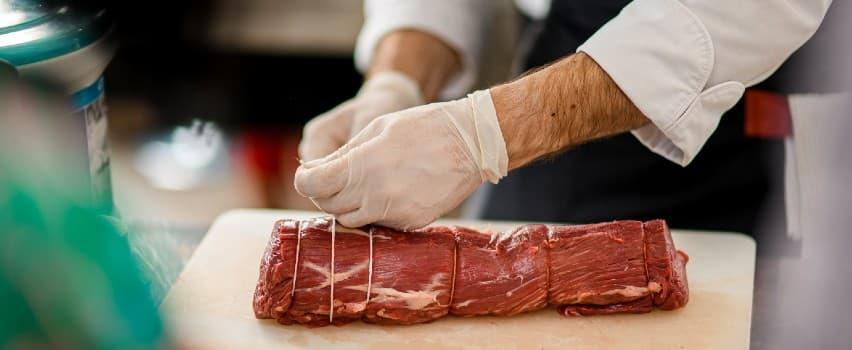What is butcher's twine and why is it so useful for butchers?
Butcher’s twine and string are handy pieces of kit that are used all the time in the butchery industry. Basically, the main function of butchers twine is to help meats and poultry cook evenly when placed in the oven. It’s not to be confused with regular twine, as it’s been made with carefully chosen materials to make it suitable for use in a culinary environment.
Twine has been a mainstay of our range here at Butchers Equipment Warehouse for over 30 years. We’ve been providing our clients with a range of quality butchers knives, butchers machinery, and butchers accessories from trusted brands at unbeatable prices for decades, so we’re fully aware of the importance of butcher’s twine, and we’re here to help you realise it too!
What is butcher’s twine?
Also known as cooking string or kitchen twine, butcher’s twin is an oven-safe string that’s mainly used for cooking joints of meat. The string is typically made from cotton, and is tied to irregularly shaped roasts to give them a uniform shape that helps them to cook evenly in the oven.
Is there a difference between regular twine and butcher’s twine?
Twine can generally be made from a variety of different materials, and synthetic. However, the key difference is that not all of these materials are fit for oven use. Some natural fibres are safe, including cotton and linen, but other types of twines made from synthetic materials like polypropylene and polyester burn too easily and give off toxic fumes, so we’d advise keeping these for decorative purposes only!
When purchasing twine, it’s always worth double checking that it’s made from a natural fibre, so it’s not at risk of melting when you put it in the oven. Cotton is the best choice as it doesn’t impart any flavours, colours or aromas into the meat.
Are there any alternatives to butcher’s twine?
Some professional chefs have been known to substitute butcher’s twine for makeshift alternatives like skewers, and ropes made from green onion when trussing a chicken. However if we’re being honest, this isn’t really advisable, as butcher’s twine is often the tidiest and most reliable option, that’s sure to keep your meat in a uniform shape throughout the cooking process.
People have also been known to use reusable roasting bands made from heat-resistant silicone as an alternative to butcher’s twine, but you need to wash these after every use and to be honest is real hassle, especially if you’re working in a busy kitchen environment. What’s more, the bands might not be long enough to secure a large roast, which means they’re pretty useless if you’re looking to secure a large joint, or a full turkey.
Above everything else though, we strongly advise against the use of jute twine. This is a brown, fibrous twine that’s used in things like arts and crafts in schools, and while it is made from vegetable fibres, it burns easily and sheds, which isn’t exactly ideal for cooking.
Where can I purchase butchers twine?
Right here, of course! All of our butcher twines and strings are crafted to help you effectively wrap joints of meat, and they’re exceptionally strong, so you have our guarantee that they won’t break while you’re tying them! We stock twines in a number of different colours to help you colour code your meat accordingly, so if you’re interested in purchasing quality butcher’s twine, or have any questions, feel free to give us a call on 01254 427721 and our team of in-house experts will be more than happy to help!




